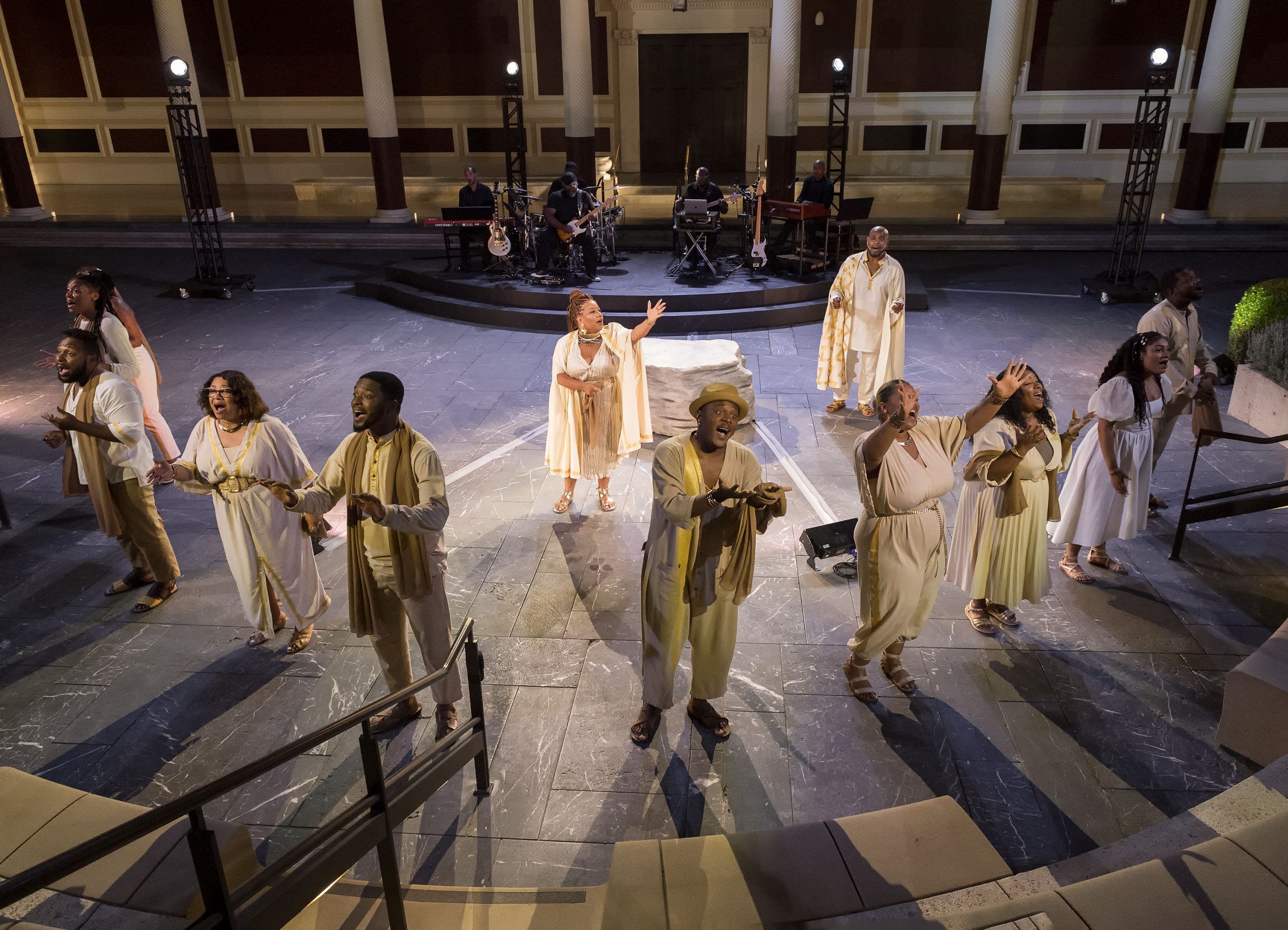THE GOSPEL AT COLONUS, adaptation by Lee Breuer, music by Bob Telson, directed by Mark J. P. Hood and Charles Newell, at the Getty Villa Museum, Pacific Palisades, September 7–30, 2023.
How often, really, in a lifetime of theatergoing, will one experience that ecstatic loss of self which, Nietzsche was sure, justified tragedy to the Greeks? Productions of The Gospel at Colonus at the Brooklyn Academy of Music in 1983 and at the Ebony Repertory Theater in L.A. in 2015, in their communal choral ecstasy, came as close as anything.
Now, at the old Getty Villa at the end of the summer of 2023, the preacher shakes my hand while making his way down the aisle of the outdoor theater: “Tonight we’re going to have some church.” That space of plutocratic classical aspiration had probably never been recast as a church like this one. Stagings of Greek tragedies at the Getty can sometimes feel like a bad Russian doll: a museum inside a museum. The Gospel at Colonus jubilantly explodes this dutiful tradition: its hybrid of Sophocles and Black music remains a singular, stunning, exhilarating remaking of Greek tragedy. This production had big shoes to fill, and did fill them, brilliantly, cannily, in fine details.
The preacher (Mark Spates Smith, who doubles as Theseus) compellingly delivers the powerful first lines of the written text:
Think no longer that you are in command here,
But rather think how, when you were,
You served your own destruction.
The addressee is Oedipus, but the preacher also speaks to the audience. From the start, the production is in command, and at the heart of this power is a reminder that one might take for self-command can constitute destructive loss. The preacher introduces the evening, without any need to wink, as a reading of “the Book of Oedipus,” and the audience is invited to see Oedipus’ suffering and mysterious transcendence as Christian allegory. This Oedipus also speaks to a secular audience as a figure for the paradoxical power that comes with abandoning fantasies of command.
Where other productions place the chorus behind the action on risers, this lean performance with its relatively small cast features a mobile, dancing chorus that at times surges forward to the edge of the audience while also vanishing behind the action when it needs to. Over the course of the evening one brilliant singer after another emerges from the chorus. Early on, Juwon Tyrel Perry, alone on the balcony above the stage, sings a gorgeous description of Colonus in falsetto. Late in the show, Shari Addison explodes as a soloist to rival any singer heard over the course of the evening.
The story in all its strangeness emerges with particular clarity. Oedipus (Kelvin Roston Jr.), Ismene (Ariana Burks), Antigone (Aeriel Williams), Theseus: the performers manage to carry the ridiculous burden of myth while also creating characters. As Oedipus, Roston Jr. conveys unspeakable regret but also the mysterious knowledge that all those broken taboos have endowed him with a counter-magic.
The main thing, though, remains how this ingenious piece, one of the most durable and surprising in the last decades of American theater, manages to reinvent the chorus. How many times have moderns complained that we will never come close to experiencing anything like the force of the ancient chorus? That may be true, and this mixture of church and tragedy may be—most likely is—something else. But that something else is something else indeed.
I was able to see this production, which originated at the Court Theatre in Chicago, only on its final, jubilant, moonlit night. It deserves further life in other places and other theaters, for other audiences who can become other choruses.
¤
Photo of the cast of The Gospel at Colonus at the Getty Villa courtesy of Craig Schwartz Photography.
LARB Short Take live event reviews are published in partnership with the nonprofit Online Journalism Project and the Independent Review Crew.
LARB Contributor
Martin Harries is professor of English at UC Irvine. The author of Forgetting Lot’s Wife: On Destructive Spectatorship, he is working on “Theater after Film,” a book about the impact of mass culture on postwar drama.
Did you know LARB is a reader-supported nonprofit?
LARB publishes daily without a paywall as part of our mission to make rigorous, incisive, and engaging writing on every aspect of literature, culture, and the arts freely accessible to the public. Help us continue this work with your tax-deductible donation today!
